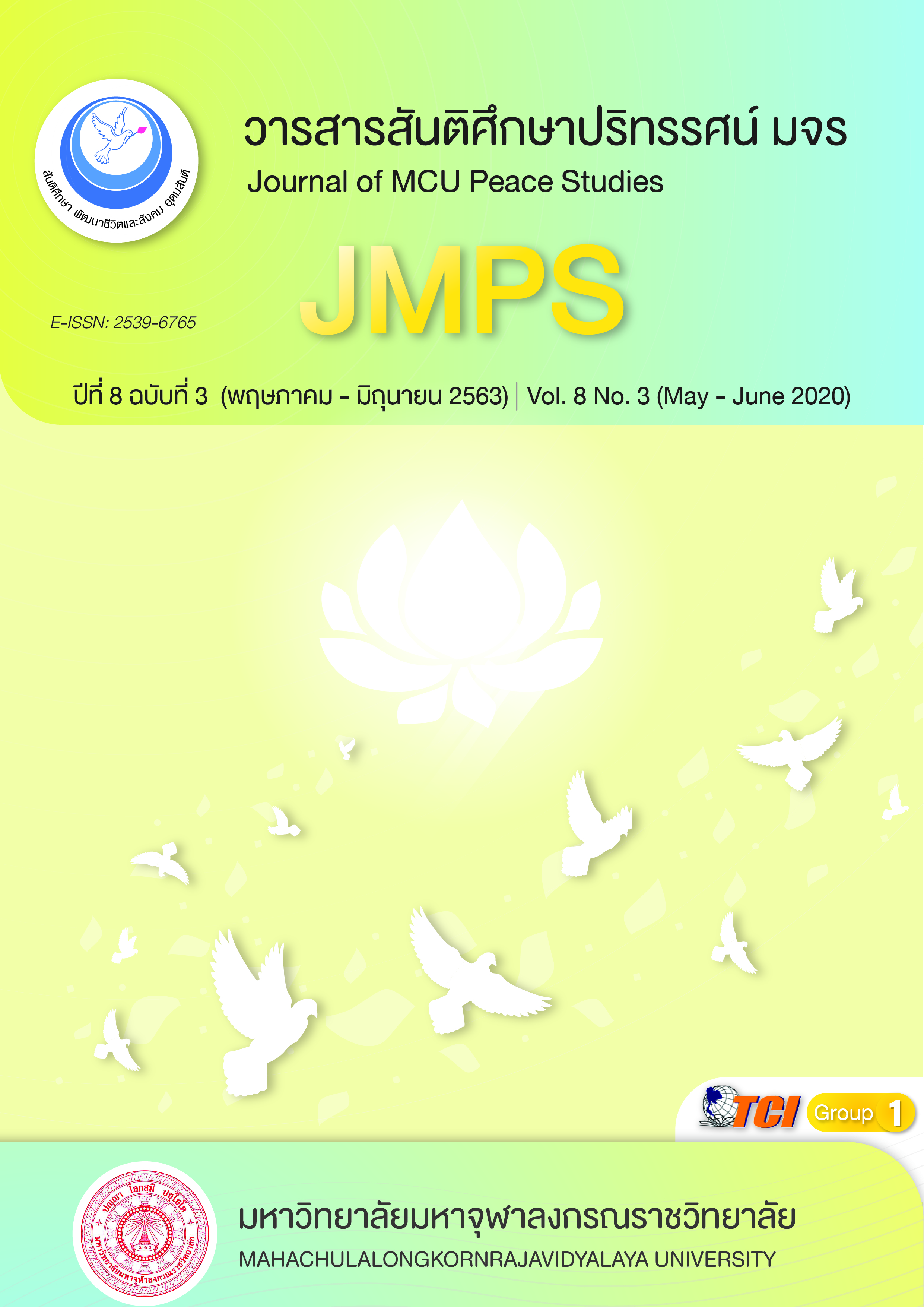รูปแบบการพัฒนาความสุขเพื่อเพิ่มประสิทธิภาพในการทำงานของพนักงาน ตามหลักองค์กรแห่งความสุข ในนิคมอุตสาหกรรมสินสาคร จังหวัดสมุทรสาคร
Main Article Content
บทคัดย่อ
บทความวิจัยครั้งนี้มีวัตถุประสงค์เพื่อ 1) เพื่อสำรวจสถานการณ์ปัจจุบันและปัญหาในการทำงานของพนักงานของนิคมอุตสาหกรรมสินสาคร 2) เพื่อสร้างรูปแบบการพัฒนาความสุขเพื่อเพิ่มประสิทธิภาพในการทำงานของพนักงานตามหลักองค์กรแห่งความสุขของสำนักงานกองทุนสนับสนุนการสร้างเสริมสุขภาพ (สสส.) โดยได้รวบรวมข้อมูลจากการลงพื้นที่สัมภาษณ์กับผู้ให้ข้อมูลสำคัญคือ กลุ่มพนักงานในนิคมอุตสาหกรรมสินสาคร จำนวน 40 คน วิเคราะห์ข้อมูลโดยใช้เทคนิคการวิเคราะห์เนื้อหา
ผลการวิจัยพบว่า
1) สถานการณ์และปัญหาในการทำงานของพนักงานในมุมมองของผู้บริหาร คือ การลาออกเปลี่ยนงานของพนักงาน การไม่ให้ความสำคัญในเรื่องของความปลอดภัยในการทำงาน และการพัฒนาตนเองของพนักงานเท่าที่ควร ส่วนในมุมมองของพนักงาน ต้องการสวัสดิการการทำงานที่เหมาะสมมากกว่าที่มีในปัจจุบัน ต้องการให้มีความเท่าเทียมกันในการทำงาน การส่งอบรม การมีที่พักผ่อน มีโรงอาหารที่เพียงพอ
2) รูปแบบการพัฒนาความสุขเพื่อเพิ่มประสิทธิภาพในการทำงานของพนักงาน ตามหลักองค์กรแห่งความสุขของสำนักงานกองทุนสนับสนุนการสร้างเสริมสุขภาพ (สสส.) ที่มีความสุขนั้น ประกอบด้วย การที่พนักงานเป็นผู้ที่มีสุขภาพดีดูแลตนเองไม่ให้เป็นภาระของผู้อื่น การเป็นผู้มีน้ำใจช่วยเหลือผู้อื่น การเป็นผู้ที่สามารถจัดการกับอารมณ์ของตนเอง การศึกษาหาความรู้การพัฒนาตัวเองตลอดเวลา การเป็นผู้มีคุณธรรมและความกตัญญู การเป็นผู้ใช้เงินเป็นรู้จักวางแผนทางการเงิน การเป็นผู้ที่รักและดูแลครอบครัวตนเองได้ การเป็นผู้ที่รักและดูแลองค์กร / สังคมของตนเองได้
Article Details
ทัศนะและความคิดเห็นที่ปรากฏในบทความในวารสาร ถือเป็นความรับผิดชอบของผู้เขียนบทความนั้น และไม่ถือเป็นทัศนะและความรับผิดชอบของกองบรรณาธิการ ยินยอมว่าบทความเป็นลิขสิทธิ์ของวารสาร
เอกสารอ้างอิง
Baker, B. D. & Karasek, A.R. (2000). Stress in Occupational health. Philadelphia: Maple Press.
Burton, J. (2010). WHO Healthy workplace framework and model: Background and supporting literature and practice. Retrieved September 15, 2019, from http://www.who.int/occupational_health/healthy_workplace_framework.pdf
Champakon, N. (2008). Factors affecting to work safety behavior of package's officer: A Case study of bangkokglass Company limited, Rayong Factory. Thesis Master of Engineering. King Mongkut's University of Technology Thonburi.
Chinachoti, P. (2014). The Causal Relationships of Factors Influencing Quality of Work Life of Commercial Bank Employees in Thailand. Dissertation Doctor of Philosophy (Human Recourses Development). Ramkhamhaeng University.
Duengkhota, J. (2016). Self-management Techniques to be happy at work. Punsuk Journal. 2(1), 43.
Fu, W. (2014). The impact of emotional intelligence, Organizational commitment, and job satisfaction on ethical behavior of Chinese employees. Journal of Business Ethics. 122(1), 137–144.
Giauque, D., Anderfuhren–Biget S. & Varone, F. (2013). HRM Practices, intrinsic motivators, and organizational performance in the public sector. Public Personnel Management. 42(2), 123–150.
Henle, C. A. & Gross, M. A. (2014). What have I done to deserve this? Effects of employee personality and emotion on abusive supervision. Journal of Business Ethic. 122 (3), 461–474.
Keashly, L. & Nowell, B. L. (2011). conflict, conflict resolution, and bullying. In S. Einarsen, H. Hoel, D. Zapf, & C.
Kenneth, N. Wexley, Gary, & P. Latham. (1983). Developing and Training Human Resources in Organizations. The Academy of Management Review. 8(1), 163-166.
Lertjitkarun, C. (2016). Happy Workplace Diversity Management. Bangkok: at 4 print. Lu, X. & Guy, M.E. (2014). How emotional labor and ethical leadership affect job engagement for Chinese public servants. Public Personnel Management. 43(1), 3–24.
Nimkerdpol, S. (2014). Leadership Style and Happiness of the Employees in the Awarded Health Care Organizations. Suan Dusit University Research Journal. 23(42), 171-192.
Paladech, J. (2016). Work Happiness Enhancement Model of Anti-Corruption Investigator at Office of Public Sector Anti-Corruption Commission Ministry of Justice. Dissertation Doctor of Philosophy (Public Administration). Rajabhat Mahasarakham University.
Peterson, Elmore and Plawman, Grosvenor E. (1953). Business Organization and Management. Illinois: Irwin.
Phothatong, T. (2014). Quality of working life, motivation and work efficiency of line– production employees in Navanakorn industrial zone, Pathumthani province. Academic Journal for the Humanities and Social Sciences Burapha University. 22(39), 169-190.
Srisaard, B. (2002). Basic Research. (7th ed.). Bangkok: Suweeriyasan.
Tantrakoon, T. (2019). Organizational Knowledge Management and Development for Adult Learners. Retrieved November 5, 2019, from https://www.gotoknow.org/posts/668227
Wichianpradit, K. (2013). Factors Related to Occupational Stress among Registered Nurses in Autonomous University Hospitals. Thesis Master of Science. Burapha University.
Wu, W.L., Yeh, R.S. & Hung, H.K. (2012). Knowledge sharing and work performance: A network perspective. Social Behavior and Personality. 40(7), 1113–1120.
Youngwiriyakul C. (2017). Happy Talent. Bangkok: TQP.
Yucharoen, T. (2014). The Linear StructuralEquation Model of Creativity, Perceived Organizational Support, The Buddhist Leadership and Happy at Work Affecting Positive Organizational Behavior. Industrial and Organizational Psychology. King Mongkut’s University of Technology North, Bangkok.


